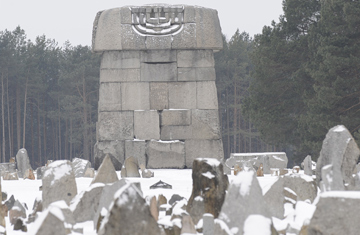
The memorial stones at the former death camp Treblinka in northeastern Poland on Feb. 18, 2011
At first glance, it seems like an ordinary, innocent photograph: a group of Polish peasants holding shovels in a field on a sunny day. But look closer and you see the skulls and bones scattered at their feet.
According to some historians, the photo was taken at the site of the Treblinka death camp in eastern Poland shortly after World War II and shows the peasants digging up Jewish remains in search of gold or other valuables. When it ran alongside a 2008 newspaper feature about Poland's postwar era, most readers didn't take much notice. But when historian Jan Tomasz Gross saw the photo, he was moved to write Golden Harvest, a controversial new book in which he argues that many Poles enriched themselves during the war by exploiting Jews, from plundering mass graves to ferreting out Jews in hiding for reward. In the book's introduction, Gross recalls how the photo made a big impression on him. "I could not understand why it passed without echo among the [newspaper's] readers," he writes.
While the photo did not create much of a stir, the book — which was published in Poland on March 10 — has. Co-written by Gross's wife Irena Grudzinska Gross, Golden Harvest charges that some Poles searched mass graves to retrieve golden teeth from the skulls of Jews murdered by the Nazis, traded glasses of water for golden coins from emaciated Jews being transported to death camps and pointed out hiding Jews to the Nazis in order to get ahold of their belongings. "Plundering Jewish property was an important element of the circulation of goods, an element of economic life, and thus a social fact, not an incidental behavior of demoralized individuals," writes Gross about the villagers living near the death camps in Poland.
Gross, a Princeton historian who was born and educated in Poland, became famous for his contentious 2001 book Neighbors, which chronicles the massacre of Jews at the hands of Poles in the village of Jedwabne during the Nazi occupation. The thesis of Golden Harvest again touches a raw nerve in a country that prides itself on being the only nation in Nazi-occupied Europe that did not have a collaborator government. Poland was home to about 2.5 million Jews before World War II, the second biggest Jewish population in the world, and Poles highlight the fact that they are the largest single nationality among those awarded the Israeli-based Yad Vashem institute's title of Righteous Among the Nations for saving Jews during the Holocaust.
But in his book, Gross examines some uncomfortable facts. The majority of Polish Jews perished at the hands of the Nazis, but an estimated 250,000 managed to hide to avoid the death camps. However, only about 40,000 survived the war. What happened to the remaining 210,000? asks Gross. In his book, he states that along with illnesses and harsh conditions, it was Poles who killed tens of thousands of Jews or revealed them to the Nazi occupiers.
"That book challenges our willingness to forget," says Henryk Wozniakowski, head of Znak, a leading intellectual publishing house in Poland, which put out the book. Znak has received many e-mails that oppose the book, and its offices in the southern Polish city of Krakow have been sprayed with graffiti.
Leading Polish public figures have criticized the book, saying the incidents described by Gross were rare and are by no means representative of Polish society. "Gross presents extreme behavior of some demoralized persons as behavior of the whole community," says Tomasz Nalecz, a historian and an adviser to President Bronislaw Komorowski. "Hyenas are everywhere. But the Polish society passed extremely well the test, which was the war. I am not ashamed of Poles."
But many Polish historians have confirmed Gross's findings. "The responsibility for the extermination of Jews in Europe lies with the Nazi Germany," writes Barbara Engelking in the recently published book It Is Such a Beautiful, Sunny Day, on the fate of Jews seeking shelter in rural communities in Nazi-occupied Poland. "But on the peripheries of Holocaust there was a place for more or less willing collaborators in the German enterprise. Polish peasants were volunteers in murdering the Jews."
Gross, who left Poland after being expelled from college during an 1968 anti-Semitic purge, says his intention is not to defame Poles but help them confront their own history. "There are still large spheres of historical reality which are unknown," said Gross in an interview on TVP1, a public television channel. "Historical research about that difficult time, which digs out the facts, helps come to terms with that history in an authentic way."
Many Poles, especially younger ones, seem willing to do just that. "Certainly it is not bedtime reading, and I will probably read it little by little," says Aneta Krzystek, a 20-year-old psychology student who bought the book the day it was published. "But I really want to read it. It is not something that we are taught at school. But we should be. We simply should know."
